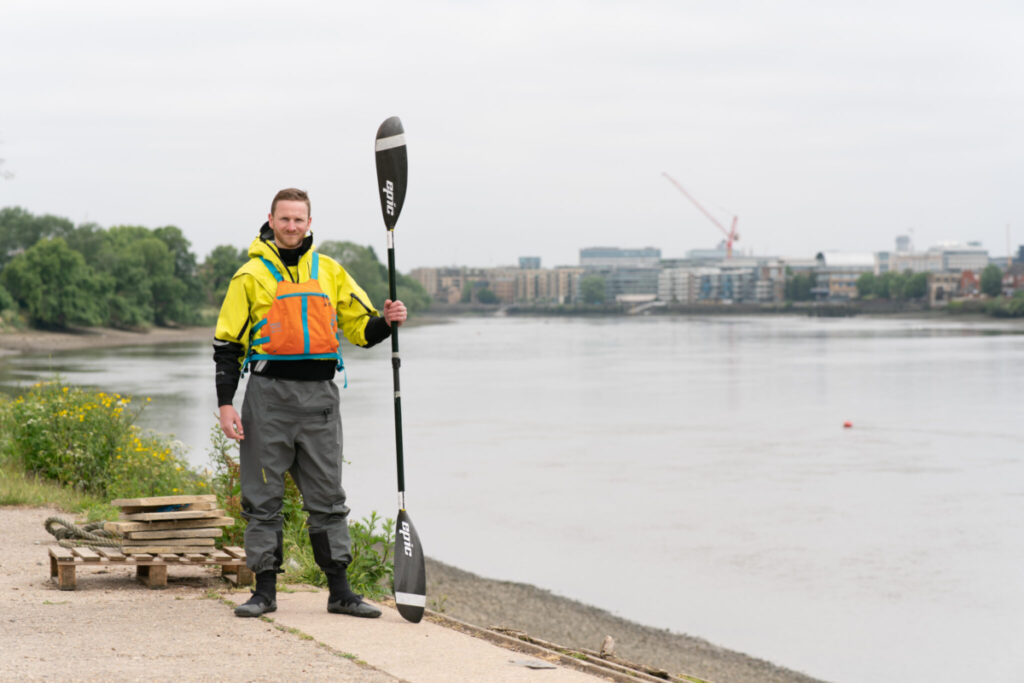A SCOTS adventurer is attempting a record-breaking Arctic voyage to kayak the 2,000-mile Northwest Passage.
On July 1, Mark Agnew and a team of three others will set off from Bylot Island, Nunavut, Canada, and hope to finish 90 days later at Tuktoyaktuk, an Inuit hamlet in Canada, as they follow the historic Arctic route that links the Atlantic and the Pacific.
Their quest will break multiple global records, by being the first time the entire route has ever been kayaked or powered by human power alone in a single summer.
The expedition has recently been made more possible through arctic ice melt as a result of global warming, which has opened up the passage and reduced danger.

Mark, also a motivational speaker and freelance journalist, who is from Edinburgh and lives in London, has been preparing for his expedition by kayaking on the Thames with the Putney Bridge Canoe Club.
By training with expert polar region expedition paddler, Jeff Allen, Mark has built up his stamina and improved his kayaking skills at sea.
Mark says that yoga has been a crucial aspect of training and helps prevent injuries.
He had two unsuccessful trips when trying to set the world record for rowing across the Atlantic twice, and was rescued two days into his first expedition in 2016.
Mark later suffered a mental health spiral, with the devastation of failure making him feel worthless and unmotivated.
After a 12 month mental health break, Mark researched resilience and realised that it can be learned, so he began to set himself challenges and gradually his trained his mind.
Mark hopes to raise over £25,000 for Wilderness Foundation UK, a charity offering education and therapy programmes for young people and adults.
Mark, who believes that kayaking has improved his own mental health, chose this charity as it helps reconnect young people to society and to themselves, through outdoor facilitation adventures, therapy and mentoring.
The route that Mark and his team will follow is the same route sought by the British Arctic exploration voyage led by Sir John Franklin in 1845 aboard two ships, the HMS Erebus and HMS Terror.
The expedition met with disaster as both ships became icebound and the crew of 129 men was lost – Mark’s team may even pass directly over the wreck of HMS Terror.
Now, 178 years later, the Arctic’s ice conditions have changed with the region at the forefront of global warming, making this world first only possible due to melting sea ice.
Mark will be joined on the expedition by three Americans – expedition leader West Hansen, Jeff Wueste and Eileen Visser.
The team will each fuel up on 4,000 to 6,000 calories per day and re-supply halfway in Cambridge Bay.
Each night they will camp on shore, setting up a tripwire to let off a bang if they are approached by polar bears while sleeping.
Mark regularly trains in Scotland for his expeditions, including frequently kayaking around Bass Rock in East Lothian and along the West Coast.
His passion for the outdoors and sense of adventure was inspired by his father, an explorer who mapped parts of Greenland and Patagonia and his mother who travelled Australia for five years in the 1970s.
Mark explained: “After failing to row the Atlantic twice, I felt utterly worthless. I was overcome with feelings of humiliation and failure.
“It began to seep into every aspect of my life, and I became lethargic. I wasn’t clinically depressed but the feeling of being pathetic became overwhelming.
“Eventually, I decided I needed to drag myself out of my hole by going on adventures again.
“I realised I had to focus on the experience and not the outcome. I began to focus on camaraderie, discovery of beautiful landscapes and being at one with nature and not just on the aspect of winning or of gaining the world record.
“That said, I’m still motivated by the world first. In the Northwest Passage, pushing ourselves as a team for the common goal of the world first is important to facilitate our camaraderie and experience.
“These intrinsic goals are far more fulfilling than focusing on a single outcome.”
Mark continued: “Getting out into nature and exercising was fundamental to re-finding my self-worth.
“I’ve been lucky my whole life to be able to get into nature.
“Wilderness Foundation UK helps countless people, particularly people from backgrounds that might not typically have easy access to the outdoors, re-connect to nature and feel empowered through their experience.”
Mark added: “This is really the ‘voyage that shouldn’t happen’. One hundred years ago the Northwest Passage would have been frozen almost all year-round, but now we are going to be able to kayak the 2000 miles in a single season.
“A rather devastating example of how much climate change has affected the planet.”
Wilderness Foundation UK’s CEO Jo Roberts, also added: “Wilderness Foundation UK has a history of patrons who have been iconic explorers and adventurers.
“Mark is no different to them in the challenges and hardships they endured and survived. His passion to challenge himself and the ocean links him to the greats of this world.
“By taking on the Northwest Passage, paddling into an unknown both within himself and the environment, he will be inspiring others to face their fears and embrace their inner strengths.
“As a charity we work with children, teens and adults whose fears hold them back from trying, failing and succeeding – and they get stuck.
“Mark will be setting them an example of what it looks like to give life ‘a go’ and we will be following his paddle strokes and courage as he braves one of the most challenging and magnificent passages.”
